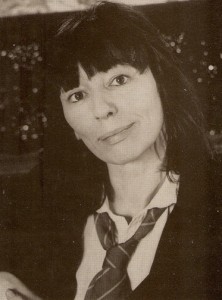
You’ll have heard this one before, I’m sure.
It’s a perennial plea since forever.
More bright women are needed in the ad business. Especially in creative and planning.
What’s required are those with the optimism, determination and insight to want to change everything.
Here we’re talking about avoiding thinking that’s wearily familiar and inert.
It’s sidestepping messaging that has just enough brilliance to rise to the mediocre level.
A model for this lies in the world of TV journalism.
It comes from Gerald Stone’s, Compulsive Viewing, a book about the Chanel 9 Television Network in Australia.
At one point he focuses is on a hypothetical TV newsroom assignment.
If the job is to create a film story on ‘anorexia’, a female journalist might showcase the problem in a particular and compelling way.
Instead of ‘talking heads’ droning on to camera, you’d get an engaging story.
Stone suggests a female journalist could take an emaciated teenager to a dress shop, turn her over to the staff and then stand back.
At this point … ‘roll cameras’.
You’d get footage of the sales people reacting to the harrowing sight of a painfully thin girl.
You’d witness their inability to find a size small enough for her withered frame. You’d feel their anxiety begin to build.
The frustration of the staff and ultimately their deep concern would seep in to you.
Suddenly you’d not just be watching TV, you’d be involved as part of the emotional trial of it all.
The point of all this?
According to Gerald Stone a man would never have thought of this idea. It would be beyond him.
Here you have an approach that seems so simple, so obvious, yet determinedly powerful.
Good ideas are often like that.
So, does it take a woman to think like this, to go beyond the expected?
Before you answer that, here’s more on the ability to push ideas further.
Take 79 seconds and watch a spot for The Body Shop in Malaysia.
It’s called ‘Unnatural Beauty’.
The commercial turns preconceived notions about role models for women on their head.
Grey Advertising, Kuala Lumpur, gets the credit. http://bit.ly/1snkikG
To create an edginess a six-year-old girl speaks innocently to camera:
When I grow up I’ll be the prettiest girl.
I’ll have long legs and a tiny waist …
A closet full of designer clothes, shoes and bags.
If I put on weight I will not eat.
If my boobs aren’t big enough
I will get an implant just like the celebrities I look up to.
If this sounds wrong to you
Stop creating an unnatural image of beauty.
Stop telling me if I’m fat or dark or short
I’m not good enough.
Praise me for qualities that matter
Like honesty, courage and compassion.
They make me so much more than beautiful.
(pause)
This is a message from The Body Shop.
Be More Than Beautiful.
There are two copywriters here, Nadia McDonald and Jessica Wong.
But gender apart, one overwhelming fact is at work.
Grey Advertising succeeded with the ‘Unnatural Beauty’ spot because someone hired the right talent in the first place.
They’re individuals who are no doubt focused on doing the ‘next thing’ instead of the ‘usual thing’.
You don’t need me to tell you there’s a difference between ‘ordinary thinking’ and something that’s representative of an imaginative intelligence.
You get the latter in Gerald Stone’s anorexia film idea and in The Body Shop spot.
Both are awake to staging human values with cleverness, relevance and a graphic understanding of the problems people face.
It’s why you’re drawn in.
So, Miss/Ms/Mrs … are you ready to sidestep the usual thing and go for the next thing?
Let’s hope so.
Share with us. Sometimes it takes more than working late into the night fueled by take-away Chinese and Diet Dr. Pepper. For more engaging ideas it often takes a woman. Leave your comment in the box below. Thanks, Steve Ulin
PS. Thanks to the cartoonist Geoff Stevenson for the Gerald Stone book, Compulsive Viewing. It may be about a television network but there are lessons for people in advertising right through it.